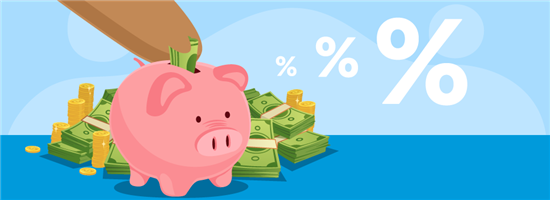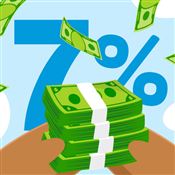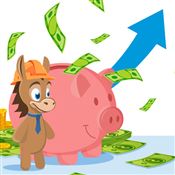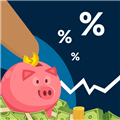Is High Yield Savings Account Worth It
Ad Disclosure: This article contains references to products from our partners. We may receive compensation if you apply or shop through links in our content. This compensation may impact how and where products appear on this site. You help support CreditDonkey by using our links.
Many high-yield savings accounts have attractive rates that are too good to pass up. But are they worth it? Read on to find out.
 |
High-yield savings accounts continue to gain traction each day—and for good reason. It's a great way to earn money passively and grow your wealth.
But is it worth it or are there better options out there? Read on to find out.
Is a High-Yield Savings Account Worth It?
A high-yield savings account is great if you're looking to grow your money without a ton of effort. It'll make your money work harder, but its value depends on how you use it.
It's ideal for short-term goals like emergencies, vacations, or debt repayment. It's also good for diversifying investment portfolios with a liquid asset.
However, if you want better returns, a high-yield savings account may not be worth it. This is because your money might not grow enough to keep up with inflation.
Advantages of High-Yield Savings
Here are some advantages of high-yield savings accounts:
- High interest rates
A high-yield savings account stands out from a regular savings account by offering superior interest rates. This means you can grow your funds more over time. - Funds are accessible
A high-yield savings account gives you convenient access to your money. You can easily make deposits and withdrawals for your daily banking needs at any time. - Protected by insurance
High-yield savings accounts nowadays usually have FDIC insurance. This means your deposits, up to $250,000 per ownership category, are protected.[1] So, even if the bank goes under, you are guaranteed to get your money back.
Downsides of High-Yield Savings
High-yield savings accounts have many benefits, but they also have drawbacks, like:
- Interest rates fluctuate
High-yield savings accounts have variable interest rates, unlike CDs. This means your earnings can change so you won't exactly know how much you'll earn in a year. - Limited in-person options
Online high-yield savings accounts often don't have physical branches, which can be a drawback for those who like traditional in-person banking. - Possible withdrawal limits
Federal regulations limit savings account withdrawals to six per month,[2] but due to COVID-19, this rule was suspended.[3] Just note that some banks may still enforce limits, so stay aware.
No. Generally, you can't lose money in a high-yield savings account because of FDIC insurance. However, paying fees and overdraft charges can eat into your earnings.
How Do High-Yield Savings Accounts Work?
A high-yield savings account is like a regular one but pays more interest. Many online banks offer it because they have fewer physical locations and lower costs, allowing them to provide better rates.
Some institutions may ask you to maintain a minimum balance or to pay monthly fees, but the best ones usually won't. Also, as long as your chosen bank is FDIC-insured, your deposits are covered up to $250,000.
How to Choose a High-Yield Savings Account
When choosing from many high-yield savings accounts, here are some things to think about:
- APY
Choose a savings account with a good APY by checking different banks and credit unions. But, don't just blindly go for the highest rates as some may have restrictions that aren't worthwhile. - Monthly fees
Some banks might charge you every month just to keep your account open. So, pick a bank with no monthly fees or choose one where you can avoid them by meeting conditions or keeping a certain balance. - Balance requirements
Check if certain offers require a minimum balance for the best APY and read account details before deciding. Many banks offer high-yield savings accounts with competitive rates for all balance tiers. - Digital banking experience
High-yield savings accounts are mostly from online banks, so find one with good online and mobile banking features. You can even check app ratings and features to help you decide.
How to Open a High-Yield Savings Account
Banks have various ways to open an account, but the online process is generally the same. Here's how it usually works:
- Go to the website of your chosen bank and select your preferred savings product.
- Fill out the application with your legal name, birth date, SSN, and contact details.
- Submit, set up your online banking credentials, and fund your account.
You can also open a bank account in person, over the phone, or by mailing your application, depending on your bank.
High-Yield Savings Offers
CIT Bank Platinum Savings - $300 Bonus
- Qualify for a $300 cash bonus with a minimum deposit of $50,000
- This limited time offer to qualify for a $225 cash bonus with a minimum deposit of $25,000 or a $300 bonus with a minimum deposit of $50,000 is available to New and Existing Customers who meet the Platinum Savings promotion criteria. The Promotion begins on September 23, 2025 and can end at any time without notice.
UFB Portfolio Savings - Earn up to 3.40% APY
- Earn up to 3.40% APY.*
- No monthly maintenance fees.
- No minimum deposit required to open an account.
- Access your funds 24/7 with easy-to-use digital banking tools.
- Enjoy peace of mind with FDIC insurance up to the maximum allowance limit – Certificate #35546.
High-Yield Savings Premier - 3.90% APY
- No account fees
- Option to open individual or joint account
- FDIC insured up to $250,000 per depositor
- Only $500 minimum opening deposit
High Yield Savings Account - 3.96% APY
- $1 minimum deposit
- No fees
- 24/7 online access to funds
- FDIC insured
Axos ONE - Earn up to 4.31% APY
- Earn up to 4.31% APY* on savings, and 0.51% APY* on checking when you meet requirements.
- Get your money up to 2 days early.
- No monthly maintenance, minimum balance, account opening, or overdraft fees.
How Much Can You Earn?
If you're planning on getting a high-yield savings account, you can use this savings calculator to see how much you can earn:
$1,000 in a high-yield savings account with a 4% interest can earn you about $40 a year. The total amount will depend on factors like interest rate, initial deposit, contributions, and how long you save.
Alternatives to High-Yield Savings
If you are still on the fence about getting a high-yield savings account, here are some alternatives you can consider:
- Certificate of Deposit (CD)
If you prefer earning a fixed rate, choosing a CD might be a better option. The interest remains the same throughout your chosen term, but your money is locked until maturity. - Money Market Account
A money market account provides a competitive rate and may offer easy access to your funds through electronic transfers, debit cards, and check-writing. However, some banks may have initial deposit or balance requirements. - High Yield Checking Account
A high-yield checking account lets you earn interest on your checking balance. It is a good choice for those who want to enjoy a decent APY while having their funds within reach through a debit or ATM card.
| Alternatives | In Terms of Rates | Funds Accesibility | Minimum Deposit | Common Risks |
|---|---|---|---|---|
| Certificate of Deposit (CD) | Higher rate than savings account and money market account | Funds on-hold for 1 to 12 months | Usually need to meet a minimum deposit | No access to the funds without penalty until maturity |
| Money Market Account | Higher rate than savings account but rates can be higher if you have bigger balance in the account | Limited up to six checks or withdrawal per month | Needs to satisfy minimum balance to apply and avoid fees | No ATM or debit card and limited to writing checks |
| High-Yield Checking Account | Higher rate than traditional checking accounts | Usually applicable for 10 to 15 transactions per month only | Usually no minimum balance requirements | Imposed fees such as overdraft fees, withdrawal fees, and more |
Bottom Line
If you want to grow your money without much effort, opening a high-yield savings account is a good way to start. You can get an impressive APY on your balance, allowing you to slowly work toward your financial goals.
Just keep in mind that the interest rates aren't fixed, meaning they will likely change over time.
References
- ^ FDIC. Deposit Insurance, Retrieved 02/14/2024
- ^ Federal Reserve Board. Regulation D Reserve Requirements, Retrieved 02/14/2024
- ^ Federal Reserve Board. Federal Reserve Board announces interim final rule to delete the six-per-month limit…, Retrieved 02/14/2024
Write to Darlene Santos at feedback@creditdonkey.com. Follow us on Twitter and Facebook for our latest posts.
Note: This website is made possible through financial relationships with some of the products and services mentioned on this site. We may receive compensation if you shop through links in our content. You do not have to use our links, but you help support CreditDonkey if you do.
|
|
|








